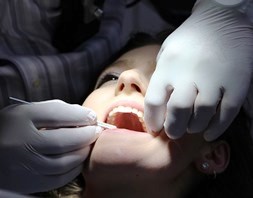Dental Hygiene Degree Programs
How to Select the Best One Near Napa California
 The most important first step to start your new vocation in preventive dentistry is to select the right dental hygienist program near Napa CA. However, you need to examine and compare your school options prior to making your final choice. There is much more to completing your due diligence than selecting the training with the least expensive tuition or enrolling in the program that is nearest to your residence. A dentistry program's reputation and accreditation are also crucial issues and must be taken into account as well. Dental hygienists usually earn an Associate Degree, as compared to a certificate usually earned by assistants, and can take anywhere from 2 to 3 years to accomplish. And consequently there is a higher cost associated with the more extensive training of a hygienist as compared to an assistant. We will explore all of these concerns and additional questions that you should be asking the dental hygienist programs you are reviewing later in this article. But first, let's explore the duties of dental hygienists and the training programs offered.
The most important first step to start your new vocation in preventive dentistry is to select the right dental hygienist program near Napa CA. However, you need to examine and compare your school options prior to making your final choice. There is much more to completing your due diligence than selecting the training with the least expensive tuition or enrolling in the program that is nearest to your residence. A dentistry program's reputation and accreditation are also crucial issues and must be taken into account as well. Dental hygienists usually earn an Associate Degree, as compared to a certificate usually earned by assistants, and can take anywhere from 2 to 3 years to accomplish. And consequently there is a higher cost associated with the more extensive training of a hygienist as compared to an assistant. We will explore all of these concerns and additional questions that you should be asking the dental hygienist programs you are reviewing later in this article. But first, let's explore the duties of dental hygienists and the training programs offered.
It Takes Just a Few Minutes to Start Your Dental Hygienist Career Below
Dental Hygienist Job Functions

When contrasting the duties of a dental hygienist to that of an assistant, the most significant difference is undoubtedly that the hygienist works more independently. Dental assistants work with and assists the Napa CA dentists and the practice. Hygienists, while also supporting the practice, deal with the patients more on a one-to-one basis. They are frequently the first person a patient sees when called from the waiting room. They examine every patient's gums and teeth and report their results to the dentists. They also may perform basic procedures. Based on state law, a hygienist's responsibilities may include:
- Removing tartar, stains and plaque
- Administering fluoride treatments
- Polishing teeth and applying sealants
- Instructing patients regarding oral hygiene
- Taking and developing X-rays
- Removing sutures and applying fillings
Dental Hygienist Education Options
Because of the additional responsibility in contrast to an assistant, dental hygienists working in Napa CA dental practices are usually required to have an Associate Degree in dental hygiene rather than a certificate. These programs can require anywhere from 2 to as long as 3 years to finish and must be accredited by the CDA in nearly every state. They are offered in trade and technical schools as well as community colleges. And in addition to classroom studies learning the fundamentals of dental hygiene, there will be a clinical aspect to the training as well. A number of programs also sponsor internships with local dental practices or dentists.Dental Hygienist Online Training Programs
 Choosing an online dental hygienist program can be a great alternative for obtaining your education. Just remember that the program will not be completely online, since there will be a clinical portion to your training. But the remainder of your classes will be provided by means of your personal computer in the comfort of your Napa CA home or anywhere else on your laptop or tablet. For those working while attending school, online dental programs make education a lot more accessible. Some may even offer lower tuition costs than their traditional competitors. And additional expenses such as for commuting, books and school supplies may be reduced also. The clinical training can typically be performed at an area dental office or in an on-campus lab. With both the clinical and online training, everything required to get the proper education is furnished. If you have the dedication for this style of learning, you may find that attending an online dental hygienist college is the right option for you.
Choosing an online dental hygienist program can be a great alternative for obtaining your education. Just remember that the program will not be completely online, since there will be a clinical portion to your training. But the remainder of your classes will be provided by means of your personal computer in the comfort of your Napa CA home or anywhere else on your laptop or tablet. For those working while attending school, online dental programs make education a lot more accessible. Some may even offer lower tuition costs than their traditional competitors. And additional expenses such as for commuting, books and school supplies may be reduced also. The clinical training can typically be performed at an area dental office or in an on-campus lab. With both the clinical and online training, everything required to get the proper education is furnished. If you have the dedication for this style of learning, you may find that attending an online dental hygienist college is the right option for you.
Questions to Ask Dental Hygienist Colleges
Now that you have decided to become a dental hygienist in Napa CA, you can begin the process of comparing schools and programs. As we covered at the beginning of this article, a number of students start by checking out the location and the cost of the schools. Maybe they look for several online options as well. Even though these may be significant initial points to consider, there are several additional questions that you should address to the colleges you are looking at in order to reach an informed decision. To start that process, we have furnished a list of questions to assist you with your due diligence and ultimate selection of the ideal dental hygienist program for you.
Is the Dental School Accredited? There are several important reasons why you should only enroll in an accredited dental hygienist college. If you are going to become licensed or certified, then accreditation is a condition in nearly all states. In order to take the National Board Dental Hygiene Exam, your dental college must be accredited by the Commission on Dental Accreditation (CDA). Accreditation also helps guarantee that the education you get is comprehensive and of the highest quality. Napa CA employers frequently desire or require that new hires are graduates of accredited colleges. And last, if you are applying for a student loan or financial aid, frequently they are not provided for non-accredited colleges.
Is Enough Clinical Training Provided? Practical or clinical training is a necessary component of any dental training program. This is true for the online college options also. Most dental hygienist colleges have associations with regional dental offices and clinics that furnish practical training for their students. It's not only essential that the program you enroll in provides sufficient clinical hours but also provides them in the kind of practice that you subsequently want to work in. For example, if you have an interest in a career in pediatric dentistry, confirm that the program you select offers clinical rotation in a local Napa CA dental office that specializes in dental care for children.
Is There an Internship Program? Find out if the dental schools you are exploring have an internship program. Internships are probably the best way to get hands-on, clinical experience in a professional dental practice. They make it easier for students to transition from the theoretical to the practical. They can also help students create professional relationships in the Napa CA dentistry community. And they are attractive on resumes too.
Is Job Placement Support Offered? Most students that have graduated from dental hygienist programs require assistance obtaining their first job. Check if the colleges you are considering have job assistance programs, and what their job placement rates are. Schools with high job placement rates probably have excellent reputations within the Napa CA dental community as well as extensive networks of contacts where they can position their students for internships or employment.
Are Classes Small? Ask the schools you are evaluating how large on average their classrooms are. The smaller classes usually offer a more personal setting for training where students have increased access to the teachers. Conversely, bigger classes tend to be impersonal and provide little individualized instruction. If feasible, find out if you can monitor a few classes at the Napa CA dental hygienist college that you are leaning toward in order to experience first hand the level of interaction between students and instructors before enrolling.
What is the Entire Expense of the Program? Dental hygiene schools can differ in cost dependent on the length of the program and the amount of practical training provided. Other variables, such as the reputations of the schools and whether they are private or public also come into play. But in addition to the tuition there are other substantial costs which can add up. They can include costs for such things as textbooks and commuting as well as school equipment, materials and supplies. So when comparing the cost of programs, don't forget to add all of the expenses associated with your education. The majority of schools have financial assistance offices, so make sure to ask what is offered as far as loans, grants and scholarships in the Napa CA area.
Are the Classes Accessible? Before enrolling in a dental hygienist college, you must make sure that the assistant or hygienist program offers classes that accommodate your schedule. This is especially true if you will be working while receiving your education and need to attend classes near Napa CA in the evenings or on weekends. And even if you select an online college, you will still be required to schedule your clinical training classes. Also, while addressing your concerns, ask what the make-up procedure is if you should need to miss any classes because of illness, work or family issues.
Find Out More About How to Become a Dental Hygienist in Napa
Enroll in the Right Napa Dental Hygienist Program
Picking the right dental hygienist course is essential if you wish to take the National Board Dental Hygiene exam or, if mandated in your state, become licensed. As we have covered, there are many alternatives available to obtain your training and it takes a relatively short amount of time to become a dental hygienist. You can receive your formal training through dental hygienist programs at junior colleges, trade schools, vocational schools and technical institutes. Graduates of these schools usually obtain an Associate Degree. Dental Hygienists usually require roughly 2 years of studies prior to entering the job market. When obtaining a degree you can elect to attend classes online or on-campus. Whichever mode of training you elect to pursue, by asking the questions presented in this article you will be in a better position to make the ideal selection. And as a result, you will be ready to start your journey toward becoming a dental hygienist in Napa California.
Napa Dental Hygienist Programs Near Me | Napa Dental Hygienist Degree
